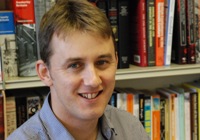The Price of Coal

Dr Steven Thompson
13 March 2013
A history roadshow to be held in Swansea will consider the human costs of the coal industry in south Wales. Through a variety of different activities, performances and exhibits, the price paid by the people of south Wales for the winning of coal during the last two hundred years will be explored by historians, trade unionists, doctors and former miners.
The Price of Coal: A Disability History Roadshow, held at the National Waterfront Museum, Swansea on Saturday 23 March, will focus on the many perils and dangers faced by miners each day of their working lives and will consider the consequences of working in such dangerous, unhealthy conditions.
The organiser of the event, Dr Steven Thompson, explained that the purpose of the history roadshow is to explore various aspects of work in the industry and the extent to which such work led to disabling conditions and permanent disability.
“South Wales was widely regarded as the most dangerous coalfield in Britain as a result of the high accident rates, the greater perils of occupational disease, particularly chest disease, and the greater rates of industrial disablement”, he said.
“I’m sure all of us who grew up in mining communities remember the numerous men missing a leg or struggling to catch their breath. Disability was all around us and yet was almost invisible because of its everyday character. This disability history roadshow will focus on the human costs of coal and highlight the experiences and attitudes of those individuals who worked in the industry.”
A series of talks by historians, former miners, trade union leaders, and museum curators will explore various aspects of work, disease and disability in the coal industry. One session, to be chaired by Dr Hywel Francis, MP for Aberavon, will consider the struggles waged to win compensation for injured workers.
Dr Francis said; “The south Wales miners have a long tradition of activism in areas of mining safety, working conditions and compensation for disabilities, and so the roadshow will give us a good opportunity to consider that activism and the consequences for disabled miners. I am looking forward to hearing what the other members of the panel, and indeed members of audience, will contribute to the discussion in this regard”.
Other activities held throughout the day include performances of mining ballads, readings from literary and historical sources, and documentary films. Stands and stalls manned by representatives of archive offices in south Wales, antiquarian book sellers, history societies and family history societies will exhibit documents, photographs and artefacts relating to the industry.
Dr Thompson said; “While there will be a great deal for visitors to engage with, we as event organisers are also very keen to hear of the experiences or recollections of those associated with the industry and its communities. People’s Collection Wales will be looking to digitise documents and images or to record visitors’ memories of the coal industry and their experiences of injury and illness. We hope that people will dust down their photo albums and family documents, and bring them along to share with us”.
The roadshow will open at 10:30am and will continue until 4pm, with various activities throughout the day. A copy of the full programme can be found at www.dis-ind-soc.org.uk/. Admission is free and a warm welcome is extended to all.
Disability History Roadshow
The Disability History Roadshow event is organised in connection with a five-year Wellcome Trust-funded research project entitled ‘Disability and Industrial Society: A Comparative Cultural History of British Coalfields, 1780-1948’. It is led by Professor Anne Borsay at Swansea University and includes colleagues at Swansea, Aberystwyth, Northumbria, Strathclyde and Glasgow Caledonian universities. The project utilises three coalfield case studies, south Wales, the north-east of England and Scotland, to explore the experiences and understandings of disability in the coal industry and will result in various academic publications in addition to public engagement activities such as public lecture and disability history roadshows in the three coalfields as well as a major exhibition that will start in Swansea in 2015 and will then tour sites in Wales.
About the Wellcome Trust
The Wellcome Trust is a global charitable foundation dedicated to achieving extraordinary improvements in human and animal health. It supports the brightest minds in biomedical research and the medical humanities. The Trust’s breadth of support includes public engagement, education and the application of research to improve health. It is independent of both political and commercial interests.



